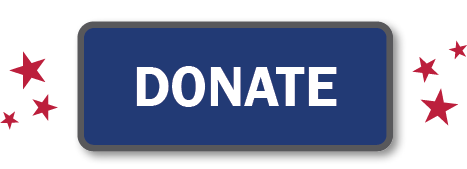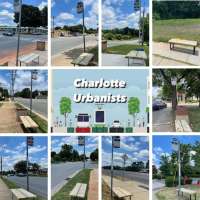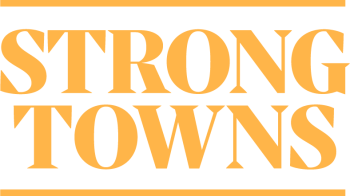John Holmes of Charlotte, North Carolina began reading Strong Towns books and articles several years ago which was a “wake-up call” for him. He was inspired to complete a Master of Public Administration and become a key member of his local Strong Towns group called Charlotte Urbanists.
Charlotte Urbanists have spearheaded initiatives focused on the comfort and dignity of bus riders, building a biking culture in Charlotte, improving safety at Charlotte’s five most dangerous intersections, and changing the conversation about how to build a better Charlotte.
One of the group’s projects has been to install benches at bus stops in Charlotte’s historically disinvested communities and at the city’s busiest bus stops. Holmes, along with Jacob Unterreiner and other group members, observed a severe lack of seating at many of Charlotte’s bus stops. In true Strong Towns fashion, the Charlotte Urbanists crew started with a “small bet”: they spent $200 of their own money and installed a single bench (donated church furniture) at a single bus stop. They watched to see how the bench would be used…and if it was going to be defaced or stolen. The experiment proved a success, and since then, Charlotte Urbanists have gone on to install 42 more benches around the city.
The group has led other tactical urbanism projects, as well. They experimented with traffic calming in South Charlotte, and also initiated “311 bombing” campaigns that mobilized a large group of people to submit 311 reports at the same time about a hazard (for example, a crumbling sidewalk) in order to bring it to the city’s attention.
Another project was to resurrect the city’s Critical Mass Bike Ride. Holmes estimates it had been almost 20 years since the last ride. Using social and traditional media, and connecting with other organizations, Charlotte Urbanists spread the word that Critical Mass was returning. They were expecting 50 to 100 people to attend the inaugural ride. Instead, 350 people showed up!
Recently, Charlotte Urbanists launched a series called Public Policy Power Hour. Holmes describes this as a “street-level lecture that you don’t have to pay for, but which covers the really important things the average citizen should know about.” The “street-level” part is key because Holmes wants the conversations to be as accessible as possible. “We’re talking about city things,” he says, “and it is helpful to be able to point to examples as you talk. Once we have identified a theme, we try to meet in a part of the city that’s relevant to that theme.”
The work Strong Towns does to help start and support local groups like Charlotte Urbanists is only possible thanks to Strong Towns members who financially support this movement. Visit strongtowns.org to learn more.





